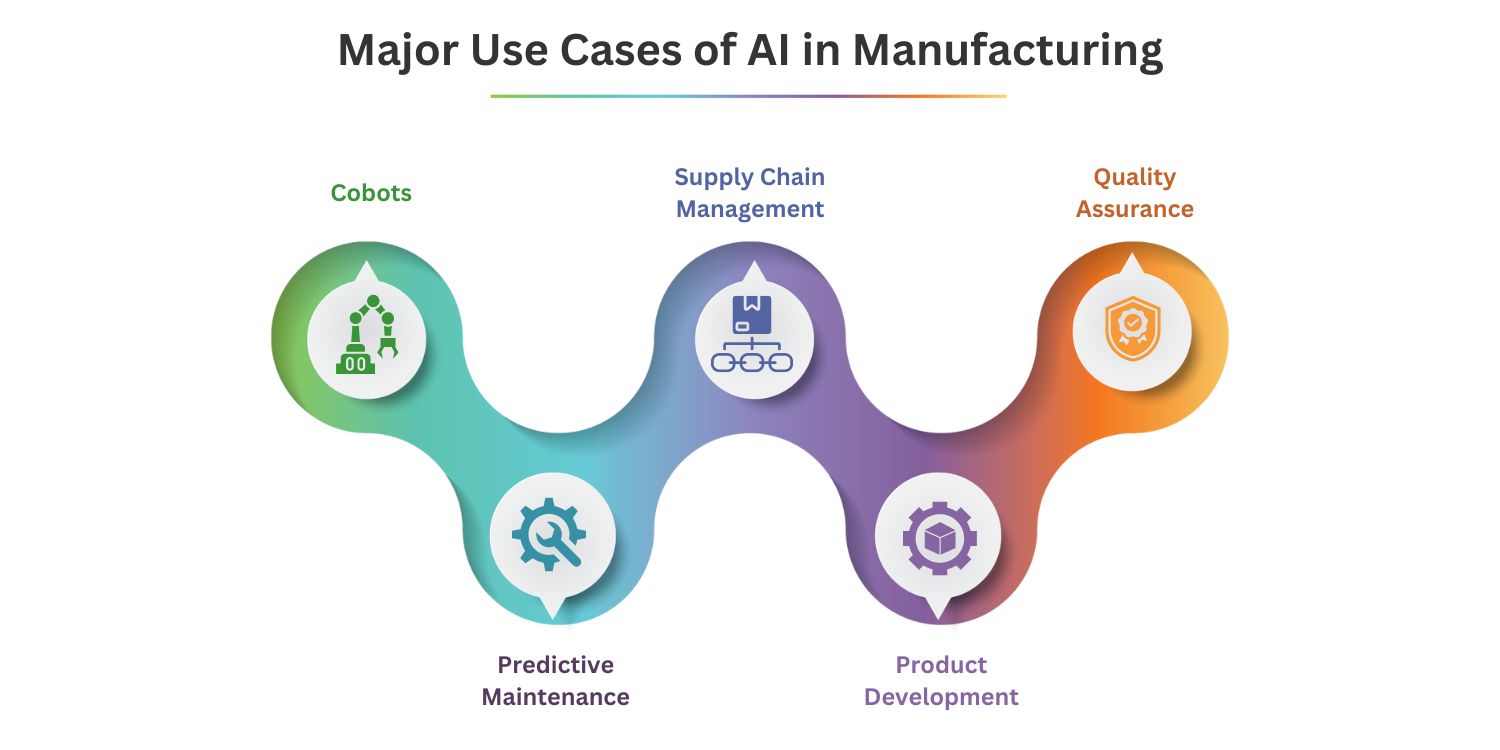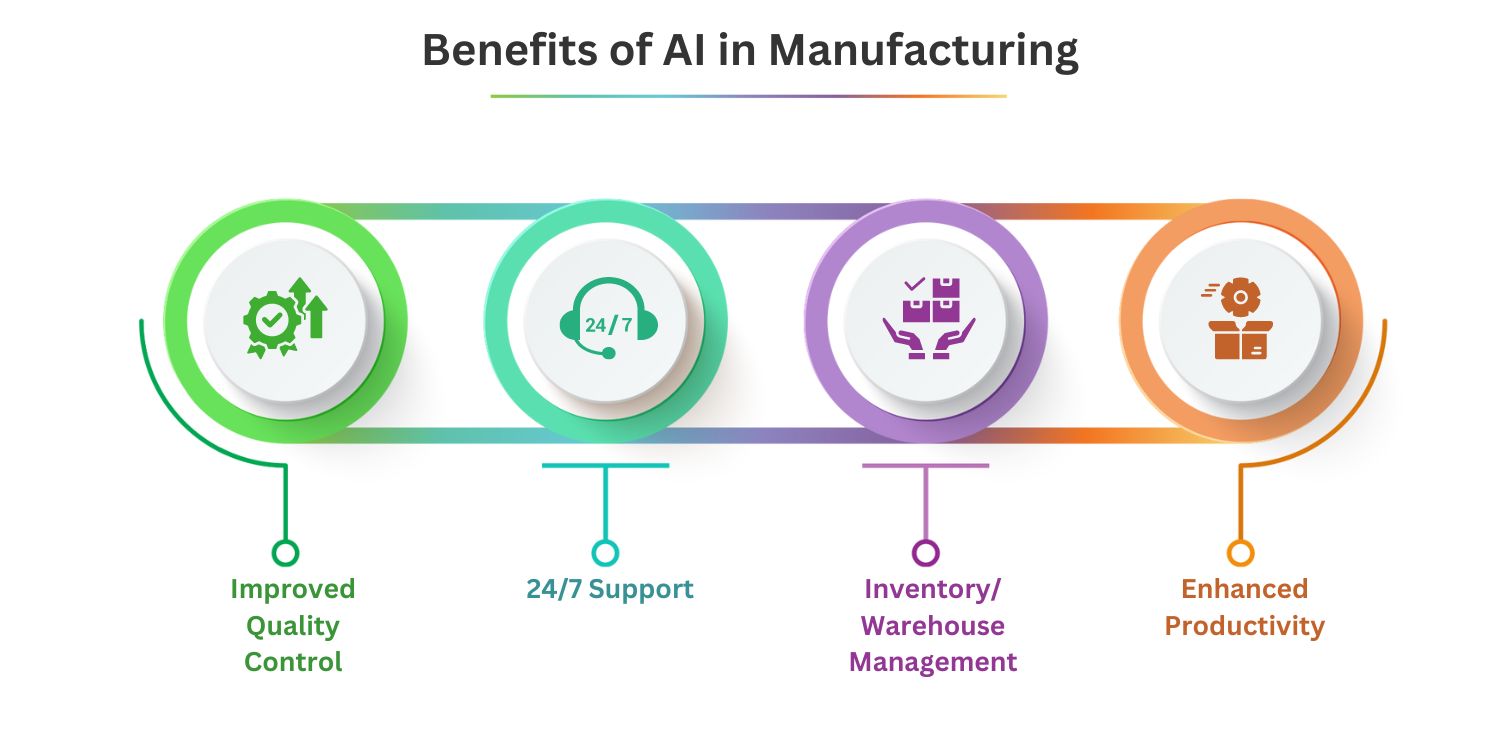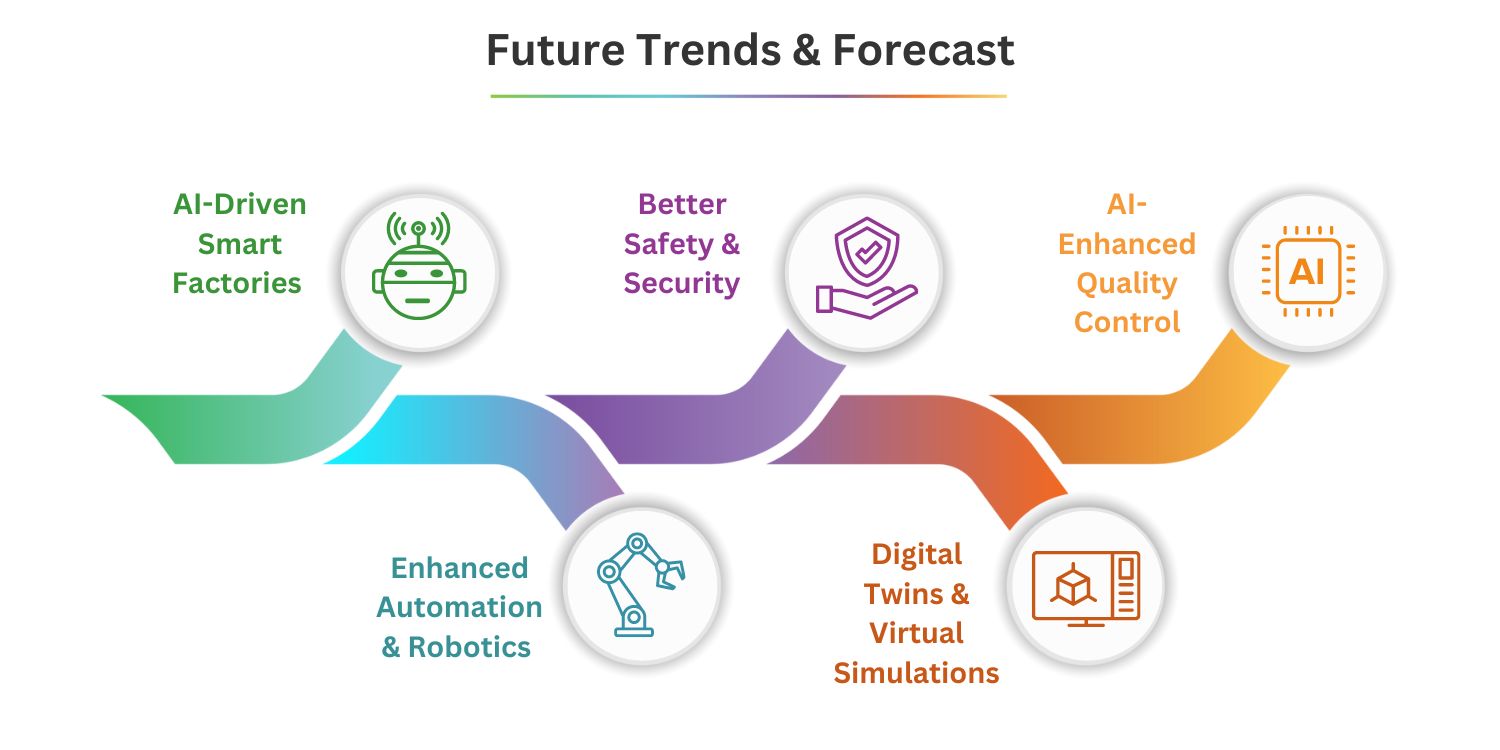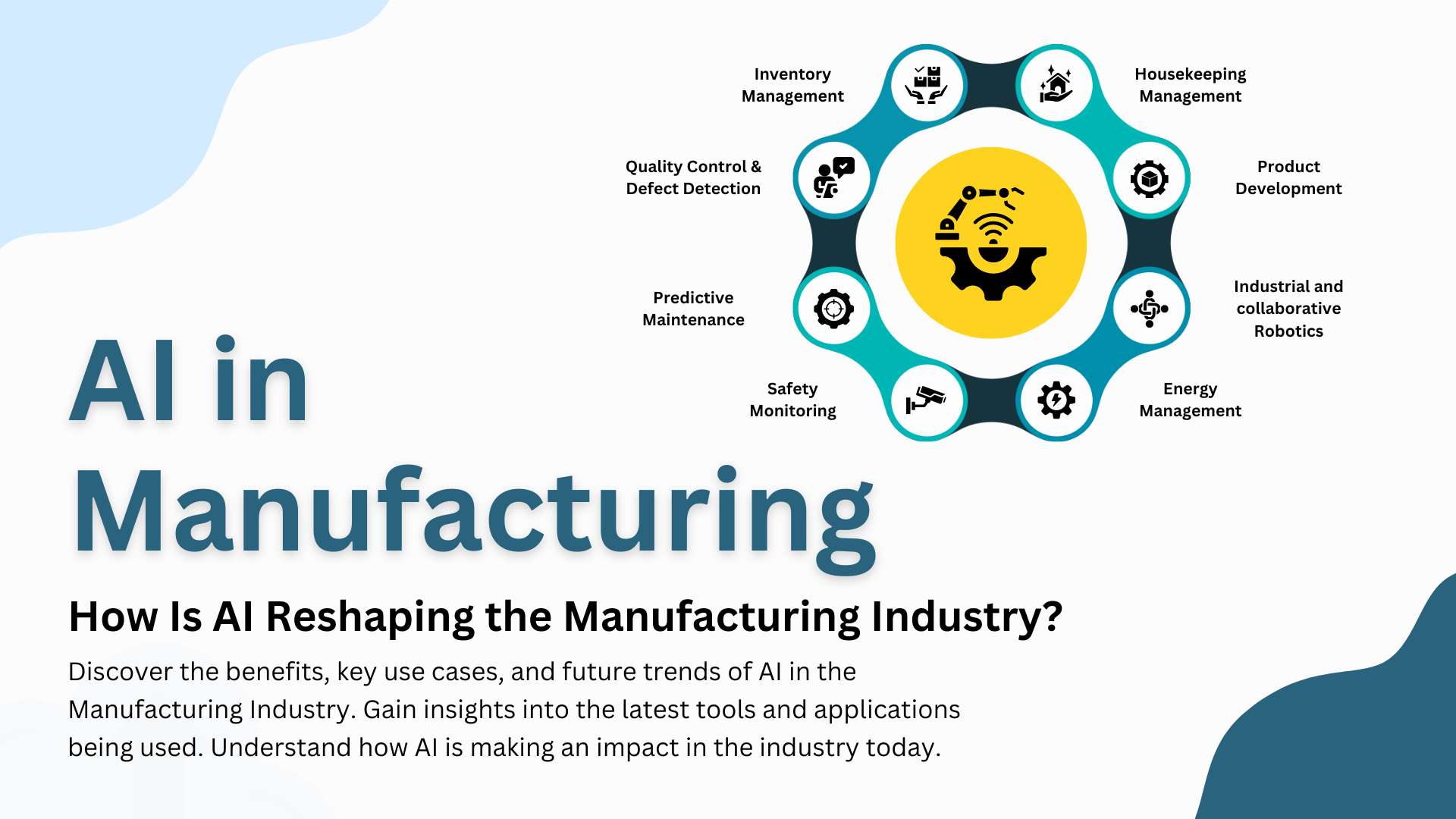“Some people call this artificial intelligence, but the reality is this technology will enhance us. So instead of artificial intelligence, I think we’ll augment our intelligence.”
– Klaus Schwab
Artificial Intelligence (AI) has grown massively over the past decade. In fact, we are pretty sure that most of you would be familiar with “Alexa” or “Ok Google”, which are present in our everyday lives, in the form of home assistants.
Now, that was about your daily life and the usage of AI for every day. But if we say that AI has ventured into the manufacturing industry as well and it is booming? Would you believe us? After the AI in IT article, we are quite sure based on our facts, figures, and research that Artificial Intelligence in the manufacturing industry has opened doors to several possibilities.
So, in this article, let’s cover all of those aspects and how the manufacturing industry is changing ever since the involvement of automation in the industry.
The Role of AI in Manufacturing: Understanding the History & Modern-Day Solution
AI’s role began in manufacturing by the 1980s, where many businesses were searching for various ways to improve efficiency. Hence, AI came into the role where manufacturers used AI applications to capture and share worker knowledge. In short, rather than depending on clipboards, notes or word of mouth, the employees who worked in manufacturing factories codify knowledge into software systems. What are those software systems you ask? Well, those are computerized maintenance management systems, also known as CMMS, or manufacturing execution systems, that stands for MES. These two made the employees’ life easy. How? They made information-sharing convenient and faster while streamlining production through automation and providing real-time data collection and more.
If you ask about “the current scenario of AI in the manufacturing sector”, then we can say that in today’s world, AI is advanced and it hands down working for quality control, robotics, predictive maintenance and even safety hazard detection.
In fact, with the use of sensors to detect mechanical issues, like abnormal vibrations or temperature spikes, AI can alert the appropriate personnel about the problem and can also tell them How, When and with Which Tool, this problem can be fixed. See, modern day requires modern solutions, and this is just an example, we have a dedicated section of AI use cases in the manufacturing industry, that will talk about all the major use cases and how AI was helpful.
Did you know Modern-Day smart manufacturing solutions like L2L Dispatch, feature these along with many more AI-driven capabilities. That’s why the reports, according to MarketsandMarkets, are talking about how AI in manufacturing industry is expected to grow at a whopping $16.7 billion by 2026.
We say that the more shop floor workers have interactive sessions with AI-enabled technologies, it means the smarter these technologies will become and make their future better.
Major Use Cases of AI in Manufacturing Industry

1. The Rise of Cobots in Manufacturing Sector
Have you ever wondered who lifts all these heavy machinery in the manufacturing industry? It’s Cobots, short for Collaborative Robots who frequently work alongside humans and function as their extra hands. Cobots can learn many tasks. For instance, they can detect and avoid obstacles on the way. In fact, people who work in manufacturing often rely on cobots to do heavy lifting. For example, cobots in automotive factories are used to lift heavy car parts and hold them in place while human workers work on securing them. These cobots, ever since its development, have also been able to locate and retrieve items in large warehouses.
2. The Concept of Predictive Maintenance in Manufacturing Sector
Manufacturing plants, railroads or other users of heavy machinery have started to use AI-based predictive maintenance (PdM) in servicing needs. If an equipment isn’t maintained properly and in a timely manner, then that firm would lose money and their precious time. Plus, if an organization does it quickly then also it’s a problem. Hence, PdM systems help to work on those issues by predicting what replacement parts will be needed and when. It also helps the workers because timely maintenance leads to better safety.
If you are wondering how PDM does all this, then it makes use of analytic capabilities of ML algorithms along with data from IoT sensors embedded in the equipment to monitor their conditions. Thus, helping workers and companies in finding out the issue before time.
3. The Use of AI in Supply Chain Management
We are sure that you must have come across the term supply chain management in manufacturing and would have noticed how big of a role it plays in the manufacturing sector. So, how does AI help in supply chain management? Typically, large manufacturers have supply chains with millions of orders, materials purchases, ingredients and what not. Handling these manually is energy draining and time consuming. To solve this, AI is used. But there’s more to AI in the supply chain.
For example, AI-powered demand forecasting accurately predicts trends and supply chain disruptions based on previous data collection. Also, when it comes to tracking shipments and on-time delivery of goods then AI helps by analyzing data and identifying patterns, helping managers make informed decisions.
4. AI is Excelling in Product Development
Another great example of artificial intelligence in the manufacturing industry is through development of newer products. AI helps to quickly glance through various data, wherein it acts like a benefit to help manufacturing industries decide what products to bring next in the market. AI also helps engineers to design new products, where they talk about what they want, and it creates several options where they can have a look at. This makes the design process faster and better.
How AI in Quality Assurance Is Impacting?
In the manufacturing sector, especially when it comes to electronics, paying close attention to every little detail is crucial. In the past, ensuring the quality of electronics and microprocessors was a manual task, carried out by skilled engineers who meticulously checked if everything was manufactured correctly and if all the circuits were properly set up.
But times have changed! Thanks to automation and AI, we now have image processing algorithms that can do this job automatically. Imagine installing cameras at strategic locations on the factory floor. These cameras can instantly and continuously assess whether each item being produced is flawless. With this smart technology, we can achieve real-time and efficient sorting of products. It’s like having a team of super-precise inspectors working tirelessly, ensuring that every single item meets the highest quality standards.
What are the Benefits of Artificial Intelligence in Manufacturing?

⦁ Improved Quality Control
As you may know, AI is fast and when it comes to the manufacturing industry then AI can make the quality control faster. AI with its automation techniques can pick up microscopic errors and issues, improving productivity and defect detection by 90%.
⦁ 24/7 Support
Artificial Intelligence in the manufacturing sector can work round the clock performing tasks with the same level of energy and accuracy. It doesn’t make mistakes or get injured, it works in any conditions and can operate a factory efficiently at any time.
⦁ Inventory/Warehouse Management
AI helps with keeping track of things in warehouses. It goes through the historical data to check sales, stock inventory, trends and what not. This makes warehouses save money and have enough products. For instance, a clothing store can use AI to predict the things that people are interested in buying. It can check the past sales and weather forecasts to keep the right clothes. This helps them to store the exact amount of clothes.
⦁ Enhanced Productivity
AI is good at simplifying complex calculations and coding and can-do tasks automatically, saving engineers precious time. With AI-driven automation, manufacturing employees can focus on creative aspects of their job, increasing productivity and unlocking the full potential. Along with that AI boosts productivity by providing easy access to insights, where engineers can quickly find suitable solutions for specific products.
What Are the Future Trends & Forecast About AI in Manufacturing?

Here are some of the important statistics we have gathered to help you understand how big of an impact AI will have in the future. So, if you are interested, then let’s get into the actual facts.
-
- Enhanced automation and robotics
- Predictive maintenance and smart asset management
- Advanced quality control and defect detection
- Optimization of supply chain and logistics
- Human-machine collaboration and augmentation
- Enhanced data analytics and decision-making capabilities
- Improved safety and risk management
- Customized and personalized manufacturing processes
- Adoption of digital twins and virtual simulations
- Integration of AI with Internet of Things (IoT) technologies
Some of the mentioned future trends are still in use in the manufacturing industry, however, the technology will be more advanced and provide accurate results.
Final Note
Artificial Intelligence is playing a major role in various industries. In this blog, we talked about manufacturing and how AI is helping employees and industries to flourish and reach the highest horizons. From supply chain management to predictive maintenance, the integration of AI has brought a massive improvement in terms of efficiency, accuracy, and cost-effectiveness.
We’re curious to hear your thoughts on AI in the manufacturing sector. We know you must have your own ideas and research done. So, take a moment and share your perspective, tell us what you feel about the manufacturing industry and how AI is making an impact.
Manufacturing industry is booming and your insights matter, it can inspire many people. Engage in conversation with your friends or family and get to know their perspective? Together, let’s build an exciting future by learning and growing. For more such information on AI and related industries, you can follow our blog page and stay updated. Till then, we have informative blogs that you can scroll through and find out your best topic for discussion.






 What is XBRL: Learn the Definition, its Benefits, and Trends
What is XBRL: Learn the Definition, its Benefits, and Trends  Agentic AI vs Generative AI: What’s the Difference and Why It Matters
Agentic AI vs Generative AI: What’s the Difference and Why It Matters  The Hidden Costs of Incorrect EDGAR Filing and XBRL Tagging – And How to Avoid Them
The Hidden Costs of Incorrect EDGAR Filing and XBRL Tagging – And How to Avoid Them  What is Agentic AI and How It’s Transforming Business Operations
What is Agentic AI and How It’s Transforming Business Operations  AI Tools For Small Businesses
AI Tools For Small Businesses